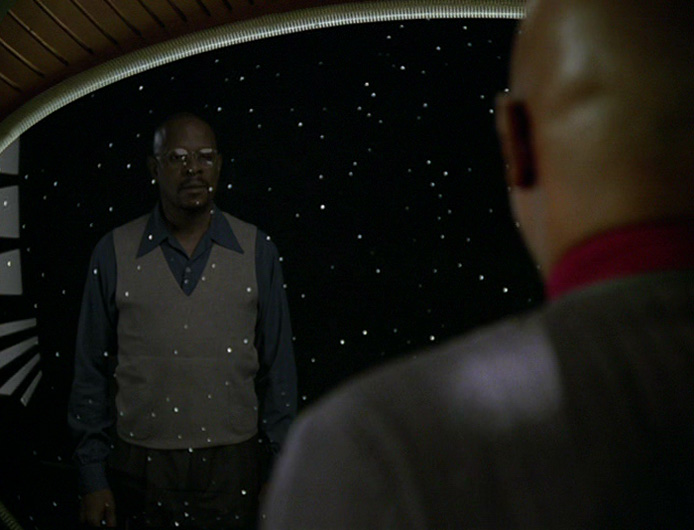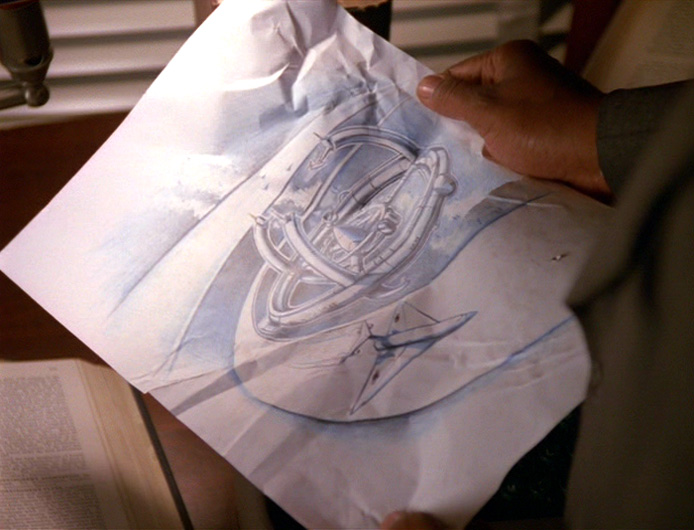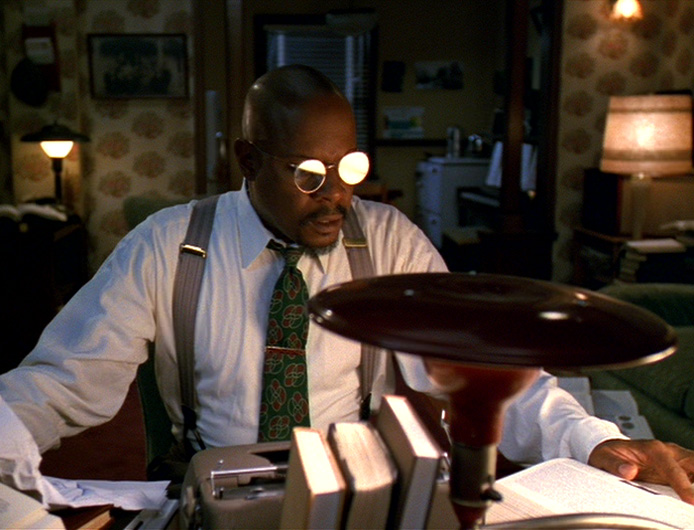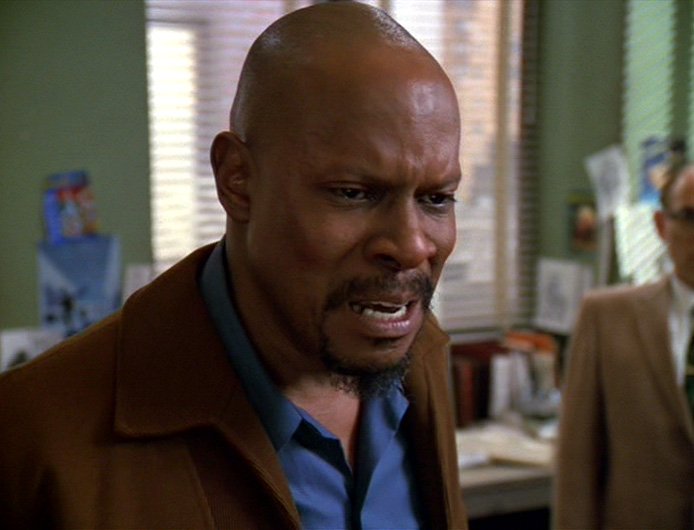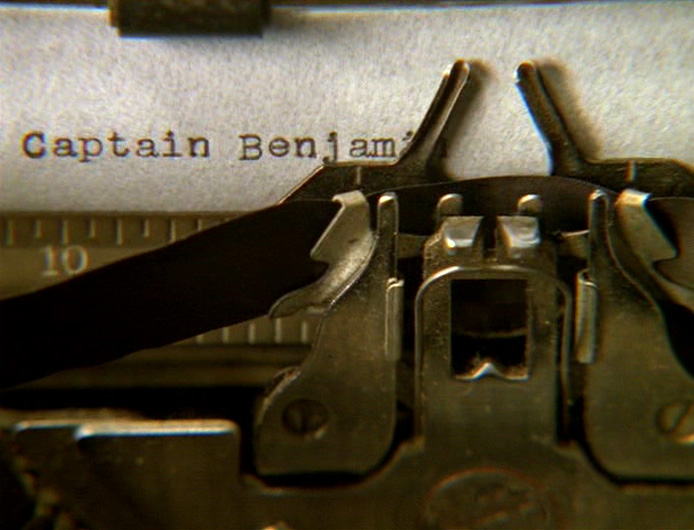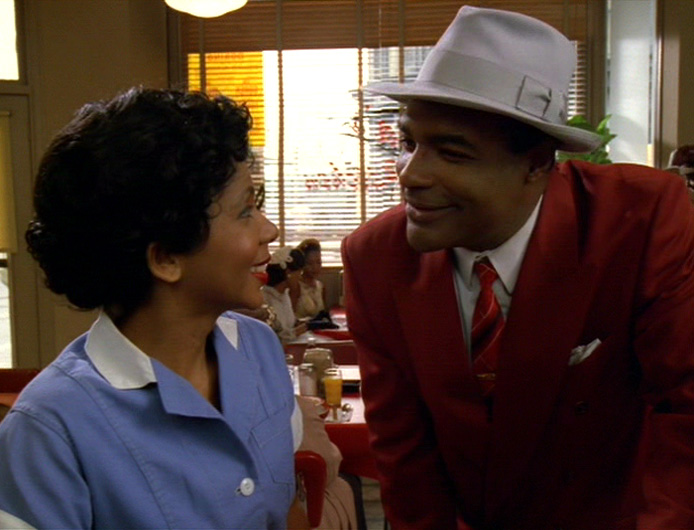Star Trek is an enormous and complex cultural entity whose impact on politics, technology, and storytelling are undeniable. For half a century, it has appealed to a vast and varied audience, and it means something a little different to each viewer. In this season of Infinite Diversity, Deadshirt founder and Trek superfan Dylan Roth explores individual Star Trek episodes and films, each with a different companion, to expand our understanding of this rich fictional universe and the one in which we live.
Dylan: I’m very excited to introduce my guest for this installment of Infinite Diversity, longtime Deadshirt staffer and pop culture polymath Dominic Griffin. Dom is an expert film, music, comics, TV, and pro wrestling analyst, but to my knowledge this will be his first time writing at length about Star Trek. Dom, could you fill our readers in on your personal history with Trek?
Dom: So, I consider myself something of a lapsed Trekkie (or Trekker.) I grew up watching The Next Generation and later, more sporadically, Deep Space Nine. I never got into Voyager and only saw the first few episodes of Enterprise. My mom was and continues to be a die-hard sci-fi nerd, which is why I was raised with Jean-Luc Picard as one of my primary masculine influences. Though I loved most of the movies, even the shitty ones, I didn’t watch the original series until my early twenties.
I’ve been planning on taking some time to rewatch TNG and DS9 in order, but I’m bad at consuming television in non binge form. For the last couple of years, most of my continued Trek love just comes from reading Infinite Diversity, to be honest.
Dylan: You’ve played a vital role in shaping this column over the years (Dom edited the first run, and I based the initial structure on his Deadshirt wrestling column, In This Very Ring), so I’m excited to dive into an episode with you. Let’s get started.
“Far Beyond the Stars” (DS9)
Season Six, Episode Thirteen
Story by Marc Scott Zicree
Teleplay by Ira Steven Behr & Hans Beimler
Directed by Avery Brooks
A War on Two Fronts
Dylan: Captain Benjamin Sisko of space station Deep Space 9 is exhausted. The long, bloody war with the Dominion has taken its toll on the man, and the news of yet another old friend killed in action has him doubting whether he can continue to bear the burden of command. Even now, supported by his son Jake, his visiting father Joseph, and his girlfriend Captain Kasidy Yates, Ben feels like he might be losing it. And that’s before he walks through the door to his quarters into New York in the 1950s and immediately gets hit by a car.
Dom: Once he comes to, Ben is under Dr. Bashir’s care, who notes that his current physical state is reminiscent of a previous encounter involving the Prophets. Reality is breaking down for the captain as he slips away from the world we know him to inhabit to a simulacrum of the past, where he’s Benny Russell, a science fiction writer working at a magazine that doesn’t allow its readers to know he’s a black man. After encountering a preacher in the streets (wearing the face of Sisko’s father) and being given a familiar piece of art as a prompt, he’s struck with the idea of writing about a black space captain.
Dylan: Benny completes his story—entitled “Deep Space Nine”—in one long night of divine inspiration, missing out on a date with his practically-minded girlfriend, Cassie (Kassidy), who wishes he’d quit writing fiction and help her buy the neighborhood restaurant. But he’s incredibly proud of his work, particularly his DS9 piece, which stars Captain Benjamin Sisko, a black man in command of a massive space station. At the restaurant, Benny talks up his story to baseball star Willie Hawkins (a human Lt. Worf) and local hustler Jimmy (Sisko’s son Jake), who dismisses the thought of “colored people on the moon.”
Dom: Once Benny passes the story along to his colleagues, it’s a smashing hit with his peers. Among them Herbert Rossoff (Quark), an outspoken progressive who, unlike the magazine’s editor Douglas Pabst (Odo), sees nothing wrong with the color of the protagonist’s skin. Of course, Pabst refuses to publish the story, for the obvious reason that the readers won’t believe a story about a black man running a space station. Benny is distraught, but once again encounters the street preacher, who encourages him to keep writing. Instead of begging off, Benny writes six more DS9 stories, eventually compromising with Pabst to publish the first story, under the condition the ending be altered to a twist dream reveal.
Dylan: Benny takes Cassie out to celebrate his victory with a night out on the town, so giddy that he literally breaks into song. But, in the words of the street preacher, “hope and despair walk arm in arm,” and moments later gunshots ring out—Jimmy has been shot dead by a pair of police (portrayed by series villains Dukat and Weyoun, out of makeup). Benny rushes to Jimmy’s side to confront the officers, who brutally beat him on the street for his defiance. As their blows land, Sisko’s enemies briefly appear in place of Benny’s attackers.
Dom: Some time passes and Benny is largely healed up. Cassie suggests he go down to the office to get out of his claustrophobic apartment. It just so happens to be the day the new issue is to arrive. But when Benny shows up to the office, Pabst informs him that Stone, the magazine’s owner, has pulped the entire run rather than publish Benny’s story. Benny is then terminated, whereupon he gives an impassioned speech about representation and the power of ideas before collapsing and being carted away in an ambulance. On the gurney, the preacher reappears. Benny asks the preacher who he really is, and the preacher tells him, “You are the dreamer, and the dream” as the outside of the ambulance transforms into the cosmos. Ben wakes up to Bashir telling him his neural readings are back to normal. As his father is set to return home, Ben shows that he’s regained his confidence in the mission before wondering aloud if their entire lives are just the dreams of Benny Russell.
“I’m writing about us.”
Dylan: While the franchise has a long history of social commentary through allegory, this is the only time that Star Trek truly tackles racism between fellow human beings, which in the context of Trek as a whole, makes it a particularly powerful hour.
Dom: Yeah, it’s interesting to see something that is usually space metaphor subtext being made very real text. What’s more interesting is that even by dialing the clock back to an era where racism was ostensibly more out in the open, it’s still written and handled very much in the Trek tone. It’s all a little nail on the head, but no less powerful for its lack of subtlety. I also like that it doesn’t restrict itself to just the plight of the black community, but also addressing sexism (with Kay having to write under the masculine pen name K.C. Hunter) and even one charged reference to McCarthyism.
Dylan: Avery Brooks—who pulls double-duty both directing and portraying the central character(s)—is fond of saying that you could transplant “Far Beyond the Stars” into the then-contemporary mid-1990s and only change the costumes, and part of me wishes that it did take place in the present day. Watching this episode in as a naive suburban white kid, it was easy for me to see this as a period piece and reassure myself that “this couldn’t happen now.” But maybe this was partly the point, to allow audiences like me to watch through the same detached lens that Star Trek usually offers with its futuristic setting, and then come to a greater understanding on my own after the story comes to a close.
Dom: I think the original story kernel this idea was based on was contemporary, but would have seen the “Benny” character be a homeless schizophrenic who thinks he’s a space captain. That the story evolved into a critique of racism in science fiction and was transported to the 50s says a whole lot about progressive white TV writers and what they think of the current landscape. I mean, they worked on a show where a black man actually was a space captain, so there had to be some self congratulatory back patting in the writers room on a semi regular basis.
But you’re right. The moment Benny runs into those cops and they blithely say Jake had a weapon, his incredulous response when he sees it’s just a fucking crowbar destroyed me. I love Avery Brooks and personally forgot that this episode houses some of his hammiest work (for better AND for worse), but that moment is maybe his best here. It’s the exact intonation I find myself shouting at my television any time I see the news and police killing is being discussed.
“You are the dreamer, and the dream.”
Dylan: Its explicit portrayal of social injustice in America isn’t the only thing that separates “Far Beyond the Stars” from the rest of the Star Trek pack. “Far Beyond…” is also an episode about science fiction, its power and importance, and even teases the possibility of Star Trek itself being a fiction inside the world of the show. The greatest benefit of the episode’s 1950s setting is its connection with the golden age of American sci-fi, as pulp magazines and B-movies began to permeate the popular culture.
Dom: This episode looks back at a formative era of sci-fi with an eye that’s as critical as it is nostalgic. There’s something really sweet about watching O’Brien be an adorably aloof version of Isaac Asimov, for instance. The show isn’t just meta for referencing itself as fiction, but even calling to attention the reflexive nature of this episode’s narrative structure. When Benny has to change his story’s ending, the “it’s all a dream” twist is rightfully indicted as a cop out that diminishes the power of his words. But the episode itself functions as an effective counter argument. Whether or not the proceedings are “real” of “canon” is irrelevant because neither story is reality. They’re two dueling, interconnected fictions and the relationship between them is the whole point. Ben is lost and is only able to remember how important his role as Captain is when juxtaposed with how hard Benny has to fight just to tell his story.
It’s really powerful stuff, even if it’s mildly hindered by Brooks’ histrionic performance as Benny, particularly in the final dramatic moments before he’s taken to the hospital. It almost looks like he passes out from choking on all the scenery he’s chewed.
Dylan: The idea that Captain Sisko and Benny Russell inspire each other is a powerful one that speaks to the importance of role models both real and fictional. To Sisko, Benny Russell is (most likely) a fiction, a story told to him by the Prophets to give him the strength to carry on the fight to protect their beloved Bajor. To Benny, Sisko is a man with his own struggles and challenges, but also one who lives in a world free of the limitations of Benny’s time. They make each other better, and the story of Ben Sisko could end up helping to create a Ben Sisko.
You and I share an admiration for The Next Generation’s Jean-Luc Picard, who’s something of a paragon of truth and compassion, and I while we’re both flawed dudes, I’ll wager that the fictional example of Picard has helped to shape your ethics and ideals. Benjamin Sisko is a much more complex character than Picard, by virtue of DS9’s darker tone and serialized format, but in a way that makes him a more important example, because (apart from the Borg incident) Picard never struggles the way Sisko does. It’s hard to imagine Benny Russell losing himself in the inspiring story of a stuffy philosopher/archaeologist living in a warp-capable five-star hotel.
Dom: As a kid, I always thought it was interesting that Sisko’s story was so tied to Picard’s. Having Picard assimilated into the Borg is basically the most fucked up thing that happens in TNG, and DS9, by extension, feels like a more layered off-shoot of that one plot strand. Losing his wife at the hands of what is essentially another show’s season finale twist starts Sisko off with a pathos that no other Trek protagonist quite matches. I mean, yeah, “dead wife” isn’t the greatest character trait, but in the context of differentiating the two series, that bit of connective tissue always fascinated me. It sets DS9 up as a world with consequences and a gray area that didn’t exist for Kirk or Picard.
“Did you catch the game last night?”
Dom: Can we talk about Michael Dorn as a sexy baseball star?
Dylan: Uh, yes, absolutely. It’s crazy to think about this being Michael Dorn’s tenth season playing Worf, and how since he’s known for pretty much nothing else that it’s easy to forget that he’s not *actually Worf.* Michael Dorn is actually A) a handsome, funny dude, and B) y’know, an actor. And while Dorn’s character in the Benny Russell story plays an important role—baseball player Willie Hawkins represents the highest social strata a black man can reach in that world, and even he isn’t welcome in white society—he’s probably got the least to do with his counterpart in the 24th Century.
Dom: But the magic of this episode is that every actor gets to stretch their legs a little and not just because many of them are appearing without their heavy make-up effects. Armin Shimerman usually has to play Quark as this slimy fuck who whines a lot, but as Rossoff, he gets to flex his chops a little and show off this captivating portrayal of righteous indignation. Other TV shows have episodes like this where the cast gets to step outside of themselves and experiment a little—“Tabula Rasa” on Buffy The Vampire Slayer comes to mind—but few examples of this trope display as sharp a contrast as “Far Beyond The Stars.” Everyone seems to be having a blast mixing it up for a change, except Alexander Siddig, who just plays Hugh Grant for five minutes of screen time.
Dylan: “Far Beyond the Stars” even makes use of Cirroc Lofton, who plays Captain Sisko’s son Jake and is easily the weakest actor in the ensemble. (He can’t really be blamed for that, he was cast when he was thirteen.) While his performance as Jimmy is, let’s say “not good,” casting Jake as Jimmy in the Benny Russell story helps to imply a deeper connection between the sober intellectual Benny and the roguish Jimmy, which makes Jimmy’s already senseless death hit just a little bit harder, both for Benny and for the audience.
Further Viewing:
Dylan: This actually isn’t Benny Russell’s only appearance on Deep Space Nine—Sisko receives another vision in the Seventh Season episode “Shadows and Symbols,” this time from the Prophets’ evil counterparts the Pah-Wraiths, who try to use Benny to break Sisko’s spirit rather than lift it. It’s not as nearly good, nor as central to the plot of the episode, but it’s an interesting curiosity. There was even an intended third act for Benny—it was briefly considered that the series should end on Benny Russell walking onto the set of a Deep Space Nine television show, but this idea was scrapped, and I think that’s for the best.
Dom: Yeah, ending the show with Benny that way is a little too St. Elsewhere. It might sound a little oddball, but I think a great follow-up to this episode is to read Grant Morrison and Frank Quitely’s seminal Vertigo series Flex Mentallo. It’s not as explicitly concerned with social commentary, but as far as thrilling explorations of the relationship between creator and creation, reality and fiction and the healing power of myth, you could do a helluva lot worse.
Infinite Diversity will return in two weeks with a new guest! Follow @DeadshirtDotNet on Twitter to keep up with what’s new here on Deadshirt, and feel free to tweet @DylanRoth with suggestions for future topics for Infinite Diversity, or just to talk about Trek. He truly never gets tired of that.

